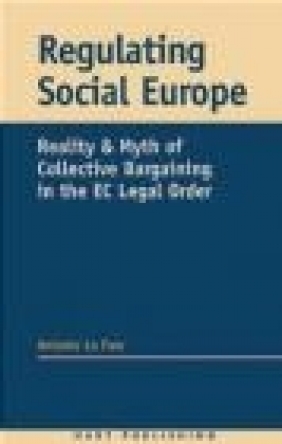Regulating Social Europe
Antonio Lo Faro, A Lo Faro
Regulating Social Europe
Antonio Lo Faro, A Lo Faro
- Producent: Hart Publishing
- Rok produkcji: 2000
- ISBN: 9781901362909
- Ilość stron: 288
- Oprawa: Twarda
Niedostępna
Opis: Regulating Social Europe - Antonio Lo Faro, A Lo Faro
A large part of the legal debate about European social integration has been focussed on social dialogue, and in particular on the role of European collective agreements, as formerly regulated by the Maastricht Agreement on Social Policy, but now incorporated into the Amsterdam Treaty. In this volume, an attempt is made to conceptualise the function of European collective bargaining, based on an analysis of the Treaty provisions specifically dealing collective bargaining, but going beyond the Treaty in several respects. Taking an inter-disciplinary approach, the book seeks to broaden the analysis of European collective bargaining, placing it within the broader institutional context of the phenomenon usually referred to as "EC regulatory deficit". Against this background the author gives proper recognition to the different factors - legal, theoretical, institutional, political and industrial-relations oriented - which converge in the field of European collective bargaining.The author concludes that in the overall context of a general redefinition of Community regulatory strategies, European collective bargaining should be viewed not as evidence of an incomplete supranational legal pluralism but rather as a construction of Community law. This original and stimulating study, excellently translated with a minimum of jargon, will be a required sorce for serious students of European 'Social' or 'Labour' Law. the book really covers fully the period up to 1997, we are offered, as a bonus, a remarkably useful frame of reference in which to reflect the seminal developments of 1998 to 2000.Bill Wedderburn, QC, FBAIndustrial Law JournalJuly 2001Hart's collection of European law titles is growing steadily, and it is interesting for an English-speaking audience to be presented with scholarship from continental Europe, with which we are perhaps not as familiar as we might be.Tamara HerveyPublic LawJune 2002...the author's approach is rich, drawing not only on legal, but also institutional, political and industrial relations sources. The thesis is compelling...The book offers many insights into the operation of the social dialogue and provides the opportunity for profound reflection on the future of the making of labour law within the European legal order.Phil SyrpisYearbook of European LawJune 2002...this book is fundamentally persuasive. The argument is carefully and thoughtfully constructed. The book is well-organized and clear, regularly summarising and reviewing the step-by-step development of the basic thesis. This makes the underlying logic of the book even more transparent, and as a result even more convincing.Mark BellMaastricht Journal of European and Comparative LawJune 2002The book is a product of high intellectual quality. There are various theoretical assumptions and conclusions outlined by Lo Faro that have caught my attention for their accuracy and their innovative, analytical, and conceptual approachSamantha VeluttiJournal of Law and SocietyFebruary 2003Introduction - subject and scenario - defining the framework of the study. Part 1 A "community based on the rule of law": from the White Paper on completing the internal market to today - apogee and decline of the community harmonisation model; the role of law in the European integration process; labour law and the institutional context - a methodological note. Part 2 Social complexity and regulatory dilemmas in the community system: regulatory deficit and alternatives to legislation - the post-positivist labour law tradition - at the root of the regulatory illusion - loss of the epistemic authority of law, an evergreen paradigm - legal pluralism; the peculiar nature of the community legal order - legal sovereignty lost "twice over" - some symptoms of the community harmonisation model's regulatory deficit, "first generation" alternatives - mutual recognition, regulatory competition, standardisation, "second generation" alternatives - the agency model, and in labour law - the "quomodo" of social Europe. Part 3 European collective bargaining - between old systems and new realities: in the beginning there were collective autonomy, pluralism and collective laissez-faire; and on the seventh day the Maastricht Summit created European Collective Bargaining; the "functional singularity" of European Collective Bargaining and interpretative tools - an interim summing up. Part 4 European Collective Bargaining and hermeneutic categories - the need for a new theoretical framework: private law classification of collective agreements and trade union "agency" in the community system; collective autonomy and European Collective Bargaining - the many reasons for an incompatibility - a collective autonomy without employees?; pluralism and collective autonomy in the community system - social pluralism and rationalisation in terms of collective labour law. Part 5 An unhappy alternative: "inconsequential" collective bargaining - the normative function of collective bargaining and the (non-existence of the) principle of freedom of association in the community legal order, a European collective laissez-faire?, state law and the "law" of the industrial relations system, freedom of association and the legal status of collective agreements; "tied" collective bargaining - pre-set limits, and subsequent assessments, legality, representative status, small and medium-sized enterprises, general approval; lessons from experience - Directive 96/34/EC on parental leave, Directive 97/81/EC on part-time work and Directive 99/70/EC on fixed-term work. Part 6 Collective agreements as a resource of the community legal order: "public law" collective agreements and neo-corporatist models in the community system - a still unlikely prospect; collective bargaining as a resource of the community legal order - European collective bargaining as a regulatory resource, European collective bargaining as a legitimacy resource; regulatory techniques and a European social constitution.
Szczegóły: Regulating Social Europe - Antonio Lo Faro, A Lo Faro
Tytuł: Regulating Social Europe
Autor: Antonio Lo Faro, A Lo Faro
Producent: Hart Publishing
ISBN: 9781901362909
Rok produkcji: 2000
Ilość stron: 288
Oprawa: Twarda
Waga: 0.56 kg
































